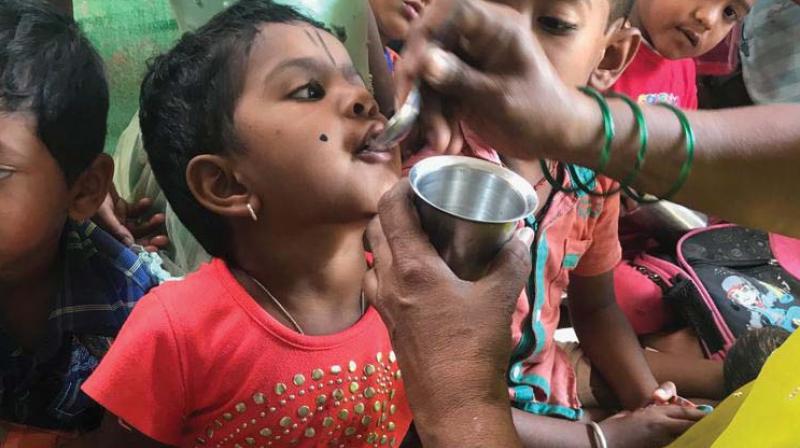Evidence Action on mission to make every child worm-free
1.56 crore children and adolescents were dewormed in approximately 75,000 government and private schools and 65,000 anganwadis

Bengaluru: The National Deworming Day is an initiative of the Ministry of Health and Family Welfare that focuses on reducing the rate of parasitic worm infection, which affects over 241 million children in the country every year. The campaign was launched in February 2015 as part of the National Health Mission to deworm all children from 1 to 19 years of age. The programme is promoted by Evidence Action, a non-profit organisation headed by Priya Jha, Director (India), and it works to support governments in developing school-based deworming programmes in Kenya, India, Ethiopia and Vietnam.
The programme aims to bring relief to children who are at risk of parasitic worm infections that can negatively impact their health, ability to learn and future productivity. Building on existing data, Evidence Action works with policymakers to design and implement effective deworming programmes at the state and national level. Through their support for the National Deworming Day alone, the programme treated approximately 260 million children in 2017.
Ms Jha told Deccan Chronicle, "The success of the National Deworming Day (NDD) has been steadily increasing and the coverage has gone up from 8.9 crore in February 2015 to 22.69 crore in August 2018. It is now accepted and understood that school-based mass deworming programmes are safe, cost-effective and can reach hundreds of millions of children quickly when implemented through a single, fixed-day approach. This round, the target is to reach 24.44 crore children and adolescents in 30 states and union territories. In Karnataka too our team is making efforts to reach the target."
The National Deworming Day is conducted twice a year, in August and February. In the last round of NDD in August 2018 in Karnataka, 1.56 crore children and adolescents were dewormed in approximately 75,000 government and private schools and 65,000 anganwadis. But still, Ms Jha said, they have some difficulty in reaching out to populations such as children in private schools and those out-of-school. However, they are working on a plan to reach those children too, she said.
"Evidence shows that regular deworming reduces absenteeism in schools, improves health and nutritional uptake, and increases learning outcomes among children and adolescents. Stakeholders at the national, state, district, block and front line health worker level have been playing a critical role in reaching out to crores of children. The focus, however, needs to be on maintaining healthy and hygienic practices that help children and communities remain safe from worm infections. The National Deworming Day has now been included in the Extended Gram Swaraj Abhiyan, Swacch Bharat Abhiyaan, Anaemia Mukt Bharat and PoshanAbhiyaan, which is a positive development for the programme's acceptance," she said.
Evidence Action has succeeded by working closely with government and communication experts to design locally appropriate awareness campaigns to increase acceptance and effectiveness of the programme.
"I am proud to be part of Evidence Action family. The only eligibility and criterion to be part of Evidence Action is passion for social development, skill and capacity to work in high-pressure conditions. All the work carried out is evidence-based and cost-effective through a scalable and sustainable model," said an Evidence Action team member from Karnataka, requesting anonymity.

